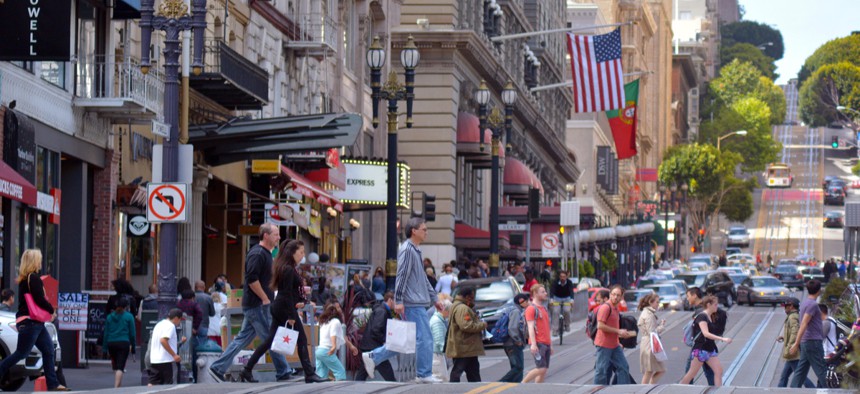San Francisco Mayor Seeks to Reinvigorate Storefront Retail

San Francisco in May 2015. Shutterstock
Mayor London Breed said she wants to spur city administrators to match the innovations that are remaking retail business models.
San Francisco Mayor London Breed is spearheading efforts to breathe new life into storefront businesses across the city, in part through legislation meant to streamline bureaucracy and ease regulations.
The plan would also offer city-funded subsidies, legal assistance and research.
"The permitting process, the city bureaucracy, the layers of taxes, the complicated mixed messages between departments has to stop," Breed told KGO-TV on Monday.
The mayor, who went on a rollout tour Monday that featured photos of her visiting barbershops and record stores, said the plan has been fueled by feedback from frustrated city merchants.
San Francisco, an urban center of the digital revolution that moved so much retail online over the last decade, is wrestling with the downside of the shift in consumer behavior. As in cities and towns around the country, offline retail in the city has suffered—the urban counterpart to the “retail apocalypse” that has made ghost towns of suburban malls. Store profits in San Francisco have plunged as rents have climbed. Businesses shy away, and vacant storefronts dot city neighborhoods, especially those away from the high-traffic center of the city. In outlying residential neighborhoods, like Excelsior, Bayview and the Sunset and Richmond, paper and tape cover shop windows and even bustling businesses hesitate to expand.
Breed is hoping to spur the city’s economic-development staffers and regulation-writers to match the kind of innovations remaking retail business models.
The legislation sponsored by Breed and Supervisor Vallie Brown steers clear of the approach taken in other cities, where landlords who fail to rent retail spaces face fines or penalty taxes. The San Francisco plan would introduce greater flexibility in zoning laws to encourage pop-up enterprises and other retail experiments. It would allow retailers to share store space and more freely combine offerings—books and drinks, meals and music, for example. Restaurants that open at night might also operate as a co-working spaces during the day. Temporary businesses could set up in empty buildings scheduled to be demolished. Existing businesses would find it much easier and inexpensive to add takeout windows or simply set up tables on sidewalks.
The $1 million in subsidies included in the proposal seem mainly designed to encourage business owners to take advantage of consulting and legal services provided by the city.
Breed said she is also considering revisiting the ban on chain stores in place in some of the city’s neighborhoods.
“We have to do more to come up with creative ideas,” Breed told the San Francisco Chronicle. “When you have a vibrant commercial corridor, it means more business for everyone.”
The Chronicle talked with business owners who detailed frustrations in working with city agencies, whose processes and requirements seem either tangled together in knots or hopelessly disconnected, leading to repeat efforts, wild cost overruns and long delays.
Salome Buelow, who recently opened a cafe called Mauerpark located just blocks from the Castro Theater, called the permitting process “highly dysfunctional, adding that it dragged on and cost her $20,000 more than estimated.
“I feel like I was thwarted and not supported,” she told the newspaper.
PREVIOUSLY, on Route Fifty:
John Tomasic is a journalist who lives in Seattle.
NEXT STORY: State Government Civics Survey Leaves Many People Stumped





